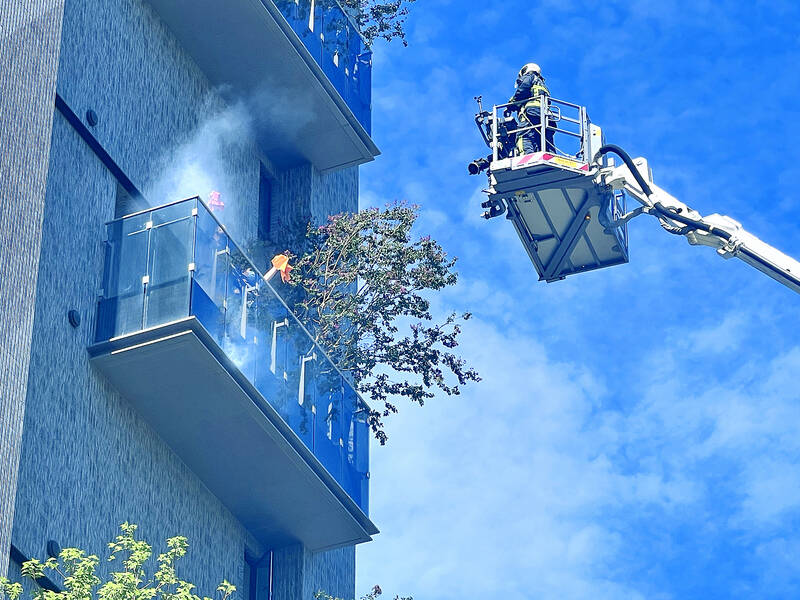The Constitutional Court yesterday struck down a rule requiring female firefighters to be at least 1.6m tall, saying that it contravened the Constitution.
Rules governing the civil service entrance examination for police and firefighters stipulate a height requirement of 1.65m for men and 1.6m for women, or 1.58m and 1.55m respectively for indigenous male and female candidates.
In 2018, a woman surnamed Chen (陳) passed the certification test for firefighters, but was eliminated from the program after a second physical exam showed her to be 1.1cm short of the height requirement.

Photo: Liao Yao-tung, Taipei Times
She filed an administrative appeal and after it was dismissed, asked the Constitutional Court to rule on the matter, arguing that the height requirement and being told to take a second physical examination contravened her rights.
Chen’s attorney during oral arguments on Jan. 16 said that the height limits have no scientific basis and deprived the plaintiff of her right to join the civil service.
The second physical exam ordered by Chen’s instructors at the academy stemmed from the provision of the regulation allowing such tests to be taken again “for cause,” a broad and vague phrase that infringes on the principle of legal clarity, her attorney said.
Lawyers representing the Ministry of Examination and the Ministry of the Interior said that the height requirement was to help ensure police and firefighters are physically capable of performing their duties and can use standard-issue equipment.
National Fire Agency Director-General Hsiao Huan-chang (蕭煥章) told the court that firefighters are expected to meet physical standards to minimize operational risks and that short people are not suitable for the job.
Indigenous candidates have separate height standards because they are shorter on average than other Taiwanese, Hsiao said, adding that using a common standard could be racially discriminatory.
However, the court said that the height limits would exclude female candidates from becoming first responders more often than it would males, contravening the equal protection principle in Article 8 of the Constitution.
The height requirement must be removed within a year of the judgement, it said.
The other part of the lawsuit concerning the rule authorizing government departments to order a second physical exam for cause was dismissed, as the court did not find the meaning of “cause” to be unclear.
Chen said that she wanted to become a firefighter to help people such as her ill mother, adding that she was dumbstruck that she could be barred from joining the service due to her height.

Right-wing political scientist Laura Fernandez on Sunday won Costa Rica’s presidential election by a landslide, after promising to crack down on rising violence linked to the cocaine trade. Fernandez’s nearest rival, economist Alvaro Ramos, conceded defeat as results showed the ruling party far exceeding the threshold of 40 percent needed to avoid a runoff. With 94 percent of polling stations counted, the political heir of outgoing Costa Rican President Rodrigo Chaves had captured 48.3 percent of the vote compared with Ramos’ 33.4 percent, the Supreme Electoral Tribunal said. As soon as the first results were announced, members of Fernandez’s Sovereign People’s Party

MORE RESPONSIBILITY: Draftees would be expected to fight alongside professional soldiers, likely requiring the transformation of some training brigades into combat units The armed forces are to start incorporating new conscripts into combined arms brigades this year to enhance combat readiness, the Executive Yuan’s latest policy report said. The new policy would affect Taiwanese men entering the military for their compulsory service, which was extended to one year under reforms by then-president Tsai Ing-wen (蔡英文) in 2022. The conscripts would be trained to operate machine guns, uncrewed aerial vehicles, anti-tank guided missile launchers and Stinger air defense systems, the report said, adding that the basic training would be lengthened to eight weeks. After basic training, conscripts would be sorted into infantry battalions that would take

GROWING AMBITIONS: The scale and tempo of the operations show that the Strait has become the core theater for China to expand its security interests, the report said Chinese military aircraft incursions around Taiwan have surged nearly 15-fold over the past five years, according to a report released yesterday by the Democratic Progressive Party’s (DPP) Department of China Affairs. Sorties in the Taiwan Strait were previously irregular, totaling 380 in 2020, but have since evolved into routine operations, the report showed. “This demonstrates that the Taiwan Strait has become both the starting point and testing ground for Beijing’s expansionist ambitions,” it said. Driven by military expansionism, China is systematically pursuing actions aimed at altering the regional “status quo,” the department said, adding that Taiwan represents the most critical link in China’s

EMERGING FIELDS: The Chinese president said that the two countries would explore cooperation in green technology, the digital economy and artificial intelligence Chinese President Xi Jinping (習近平) yesterday called for an “equal and orderly multipolar world” in the face of “unilateral bullying,” in an apparent jab at the US. Xi was speaking during talks in Beijing with Uruguayan President Yamandu Orsi, the first South American leader to visit China since US special forces captured then-Venezuelan president Nicolas Maduro last month — an operation that Beijing condemned as a violation of sovereignty. Orsi follows a slew of leaders to have visited China seeking to boost ties with the world’s second-largest economy to hedge against US President Donald Trump’s increasingly unpredictable administration. “The international situation is fraught